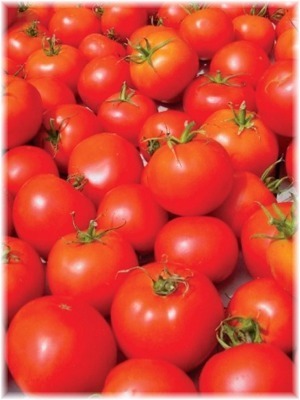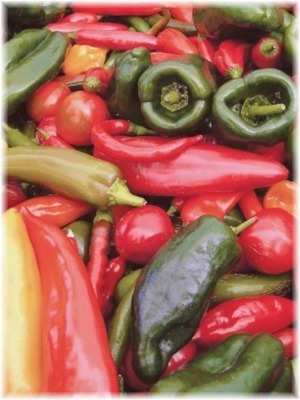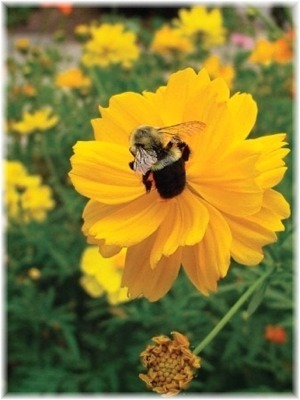 |
 |
 |
 |
John Scheepers Kitchen Garden Seeds
Seed-Starting Timetables
Seed-Starting Timetables
Thank you for having signed up for horticultural emails from Kitchen Garden Seeds, Van Engelen and John Scheepers*. Pictured from top to bottom: Carmello Tomatoes; Veronica Romanesco Broccoflower, Amazing Cauliflower and Purple Graffiti Cauliflower; Chile Peppers; and our Sunshine Cosmos Mixture.*
As the cold winds blow and the snow flies (again), it is the perfect time to plan your spring and summer gardens with the Kitchen Garden Seeds catalog. Make a wish list of the vegetables and herbs that you would like to grow. Think about what you want to harvest for delicious, sultry terrace dinners with family and friends, and bracing feasts to put away for hearty nourishment on cold winter nights like these.
While you have the time, pull out your favorite seasonally-inspired cookbooks, brainstorm new menus and decide what you can grow in your own garden for this season’s culinary repertoire. Don’t forget your floral wish list for abundant display gardens and lush, ever-full cutting beds, or the seeds you will need for culinary hostess and holiday gifts, and special crafty gifts (like gourd birdhouses). Ask your children what they would like to grow in their own little patch~pumpkins, sunflowers, purple carrots, yellow cherry tomatoes or a morning glory-covered tee-pee?
From a practical perspective, consider making a two-part order. The first, most timely part, includes the varieties that must be started indoors for transplant into the garden later. The second part would be the list of varieties to be direct sown into the garden once the threat of spring frost has passed.
Here is the general seed-starting schedule. It is based on the standard rule of thumb (for seeds that need to be started indoors) to start seeds eight weeks before the last expected spring frost date.
Eight-week General Seed-Starting Timetable
Horticultural Zones 9 & 10: Start seeds indoors now.
Horticultural Zone 8: Start seeds indoors in early February.
Horticultural Zone 7: Start seeds indoors in mid February.
Horticultural Zone 6: Start seeds indoors in late February.
Horticultural Zone 5: Start seeds indoors in early March.
Horticultural Zones 1-4: Start seeds indoors in mid to late March.
There are vegetables, herbs and flowers that require more or less time than the standard eight weeks. Here are the seed starting schedules for them:
Vegetable/Herb Seed-Starting Timetable
Four Weeks: Melons, Bitter Melon and Cucuzzi Edible Gourds.
Six Weeks: Asparagus, Fennel, Onions, Rhubarb, Shallots, Tomatillos, Basil and St. John's Wort.
Ten Weeks: Celery, Celeriac, Jicama and Lemongrass.
Eleven Weeks: Leeks, Artichokes and Cauliflower (transplant out four weeks before the last frost date).
Twelve Weeks: Cardoons and Brussels Sprouts.
Sixteen Weeks: Strawberries (for first year crop) and Rosemary.
Flower Seed-Starting Timetable
Five Weeks: Alyssum.
Six Weeks: Cutting Ageratum, China Asters, Celosia, Cleome, Coleus, Nepeta Catmint, Echinacea, Euphorbia, Forget-Me-Nots, Dahlia, Nicotiana, Scabiosa, Snapdragons and Thunbergia.
Eight Weeks: Baby’s Breath, Black-Eyed Susans, Milkweed, Coreopsis, Gaillardia, Globe Amaranth, Helichrysum, Hibiscus, Hollyhock, Heuchera, Nigella, Platycodon, Statice and Yarrow.
Ten Weeks: Dianthus, Digitalis, Lobelia and Heliotrope .
Looking for a hands-on, down-to-earth book to help you get started or improve your gardening practices? We heartily recommend Barbara Damrosch’s The Garden Primer: The Completely Revised Gardener’s Bible. New York, NY: Workman Publishing Company, Inc., 2008. ISBN 978-0-7611-2275-3. Practical, insightful tips from Barbara are also featured on our website under Horticultural Tips. If you are starting to garden with seeds, you will enjoy reading her essential “Do's and Don'ts of Seed Starting”.
For seasonal menu inspiration, check out our ever-growing collection of recipes at www.kitchengardenseeds.com Here are some of our favorite seasonally inspired cookbooks that you might like too:
*Bishop, Jack. Vegetables Every Day. New York, NY: HarperCollins Publishers, 2001. ISBN 0-06-019221.
*Lawson, Nigella. Forever Summer. London, England: Chatto & Windus, 2005. ISBN 0-7011-7615-6.
*Pasanen, Melissa with Gencarelli, Rick. Cooking with Shelburne Farms~Food and Stories from Vermont. New York, NY: Penguin Group (USA) Inc., 2007. ISBN 978-0-670-01835-2.
Maybe I'll start some seeds again this year under lights. I used to start all my own plants but then we went through the "unending kittens" stage and disasters were constantly occuring. Maybe our cats are too fat and old and lazy to bother destroying my seedlings if I try again?
ReplyDeleteYour work is magnificent!!!! You are quite talented!
ReplyDeleteThanks Anony,
ReplyDeleteI appreciate your visiting my blog!
Hugs,
Barb